Travelling here can be confronting but should we stay away?
This Middle Eastern country can be uncomfortable for the Western woman but it’s exotic, enticing and I want to go back.
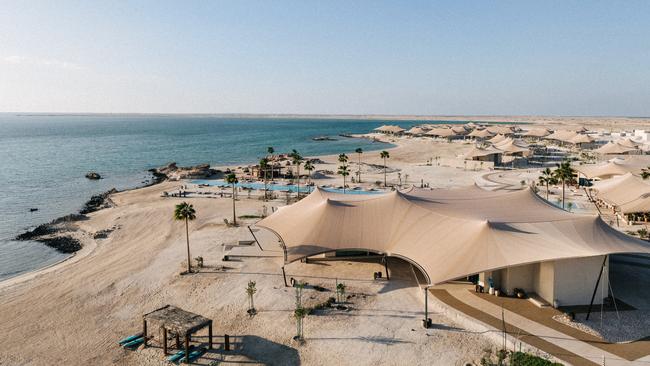
Watching the sun take its final bow amid a blaze of brilliant oranges, pinks and reds in the Qatari desert is something I will never forget. The retreat, finally, of the blistering, unrelenting light transforms the desolate landscape into a place where life can exist out in the open.
The descent of total darkness also heightens senses to take in what is happening around me.
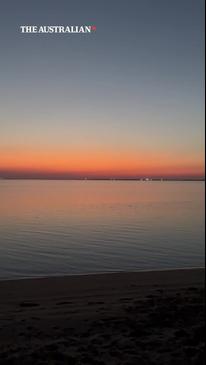
There are the spicy, intoxicating scents of burning incense made from wood chips mixed with smoky cardamom and cumin aromas from the wood-fired grill where dinner is being cooked. A man slowly strums a sitar, serenading the sun’s farewell and there’s conversation and laughter around candlelit tables as families eat together.
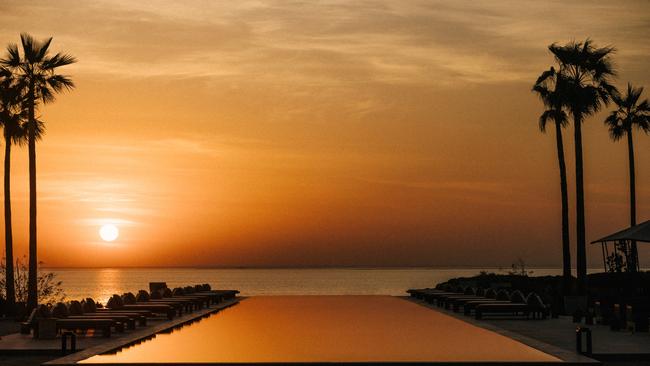
I am at the newly opened Our Habitas Ras Abrouq resort on the Zekreet Peninsula in western Qatar. Across the turquoise waters of the Persian Gulf is Saudi Arabia, while in the other direction lies Iran.
There is so much conflict in this region but on this first visit – actually getting off the plane in Doha instead of just passing through on the way to Europe – what strikes me most is how humans have survived over the years in this inhospitable rocky moonscape and how their culture, traditions, food and way of life are shaped by the environment.
“The Zekreet Peninsula is a UNESCO Biosphere Reserve not only because of the rare geology and topography but as a haven for archaeologists who have found fossils that are 7000 to 10,000 years old,” explains Sansa, my guide. “And they have been able to do that because there has never been a permanent settlement here. There were nomadic tribes who would migrate from water source to water source but essentially it has been left untouched.”
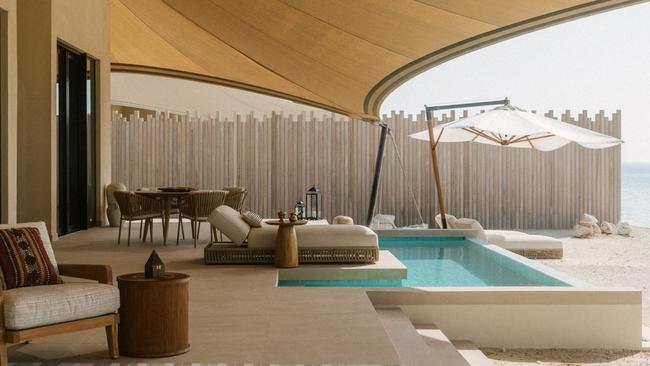
This does not surprise me, given the heat. I am visiting in early April, just coming out of northern winter, and staff are in shirts, jackets and even jumpers despite it being 35C. I’m sweating in my summer attire, although long sleeves are essential given the sun’s intensity. A stunning infinity pool sits alongside the beach but its lounge beds remains largely empty. The attentive staff tell me they put giant blocks of ice in the water to reduce the temperature, which in summer can hit 50C.
The other reason why there is no one on those lounges is because Qatar is a Muslim nation. Unlike the more relaxed resorts and expat enclaves in Doha frequented mostly by westerners, many guests here are from even more conservative countries, such as Saudi Arabia. I see few women who are not fully covered during my stay. Coming from Australia, where usual beachwear means shorts or bikinis, it’s confronting to see women head-to-toe in black abaya robes and headscarves walking on the sand. Some of the male guests are not so restricted, free to wear shorts and T-shirts.
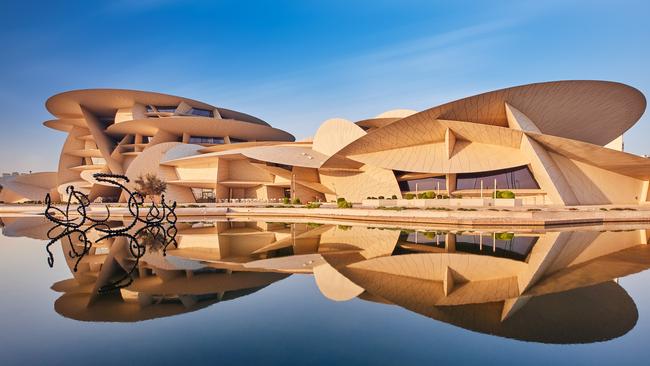
But I am in the Middle East. If I choose to visit an Islamic country ruled by one family, what right do I have to be critical? Should I not just stay away? I find myself wrestling with this question while being entranced by a place that feels like another world.
At the impressive National Museum of Qatar in Doha, I learn about the traditions of Qatari people going back hundreds of years – how Bedouin tribes constantly moved between al barr (the desert) and the coast to find water and pastures for their animals and to trade goods.
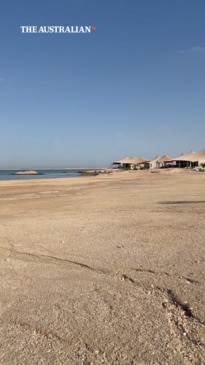
There is a high value placed on karam, which translates to hospitality and generosity, always giving your guest the best of what you have. Sansa explains the unspoken rule of the desert was that if you were lost, you could go to anyone’s tent and stay for three days. The tents were made of fabric woven by women from white camel or black goat hair, the colour signifying a tribe’s wealth (white was wealthy; black was not). A host would provide food, shelter and protection without question.
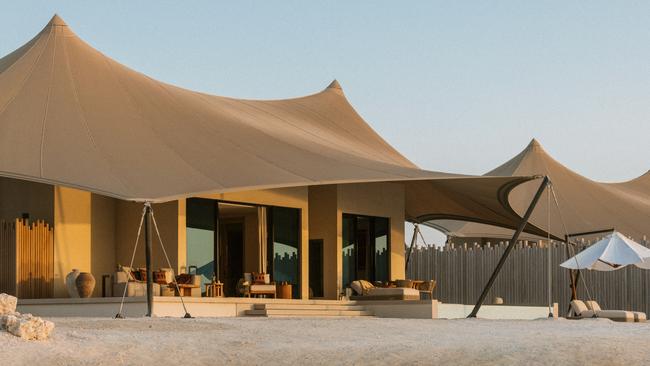
The oud incense I smell throughout my stay has long been used to welcome guests. In a plant-lined courtyard off the main reception area of Our Habitas Ras Abrouq, I select a pebble of resin, made from hardened tree sap and essential oils, and place it on an incense burner. I am instructed to shut my eyes and take three deep breaths of the powerful aroma and relax; it is a surprisingly effective way to reset the mind after 16 hours of travel.
The interiors of the 42 tented villas, with one to four bedrooms and each with private pool, plus the public areas, library, spa and Qissa (meaning “story” in Arabic) restaurant, are similarly inspired by Qatari culture and traditions. A modern neutral palette reflects the landscape and is layered with different textures, from Arabian rugs patterned in dark reds to matching cushions, ornate brass lamps, beautifully detailed screens and oversized ceramics. In my spacious one-bedroom Brouq Villa overlooking the beach, a handcrafted box awaits, full of sweets, plump dates stuffed with coconut and pistachio nuts, baklava and other sticky pastries.
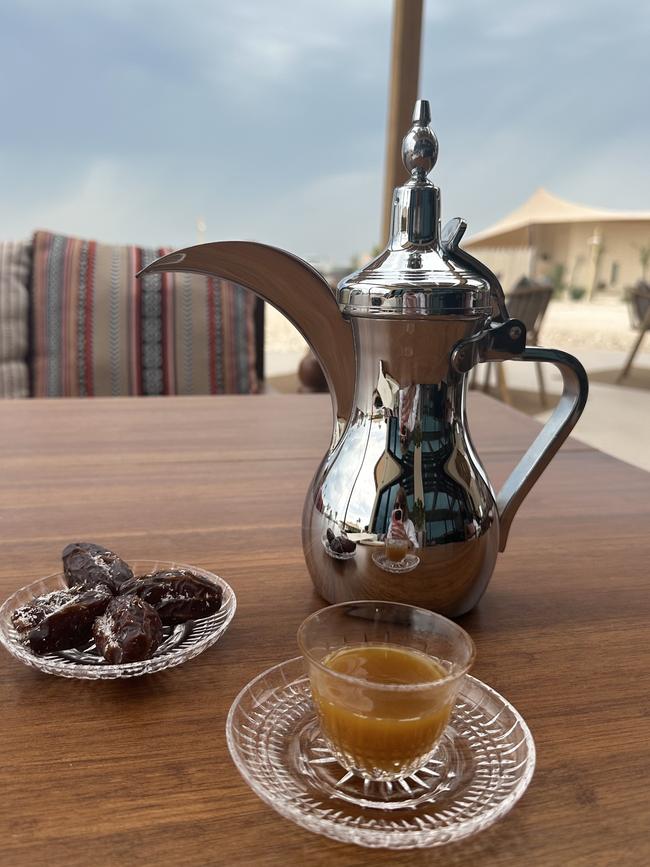
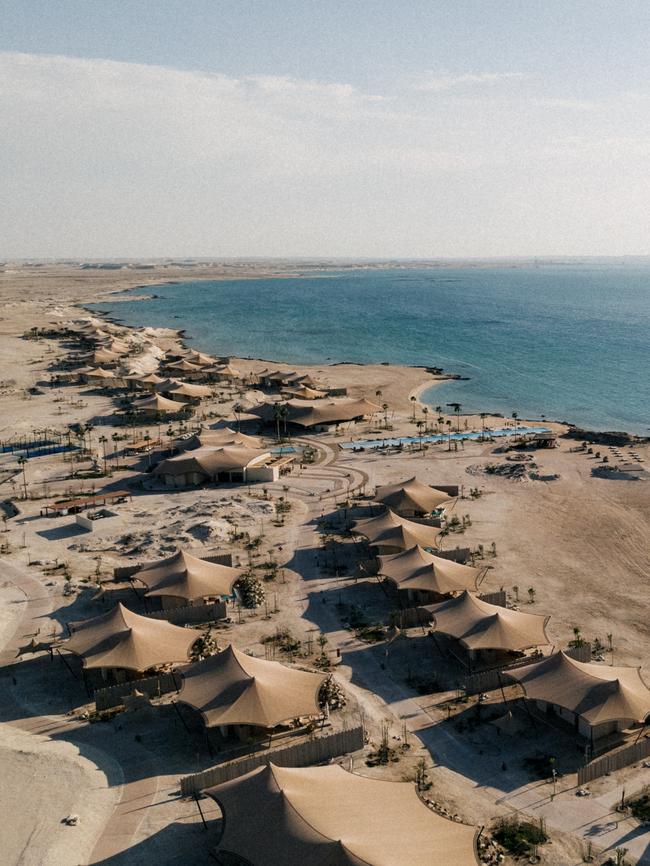
The food journey continues with breakfast at Qissa, where labneh is served with honey and sprigs of dill, and the shakshuka eggs are perfect. For dinner, there is a mezze of dips and breads, stuffed roasted eggplant, and couscous with black chickpeas and almond slices. There is no alcohol on the menu (the beachside bar is the only place guests can order drinks at Our Habitas Ras Abrouq) but there are various juices.
My standout discovery is Arabic coffee, known as qahaw, a symbol of hospitality since the 15th century. The ritual of preparing and serving it is on UNESCO’s intangible cultural heritage list for Qatar, along with falconry, the date palm, and communal spaces known as majlis. The coffee-brewing process takes half an hour and starts with roasting beans over a flame, then grinding in a mortar and pestle with cardamom, saffron and other spices.
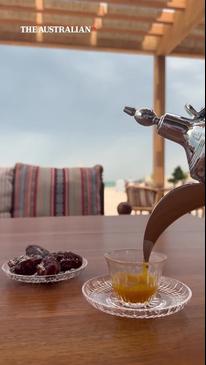
This blend is added to boiling water, simmered and served in a beautifully shaped coffee pot, called a dallah, and poured into tiny cups without handles, known as finjan. The serving is considered a form of communication between a Bedouin host and his guest; the coffee must be poured from the left hand into a cup held in the right. The other way around is considered an insult to the guest; likewise, a guest must drink from their right. Watching my waiter perform the ritual at Qissa, I realise it’s no easy feat. Thankfully, he doesn’t spill a drop of the aromatic golden-hued brew and I enjoy every last sip, even though the flavour is nothing like the coffee most of us would know.
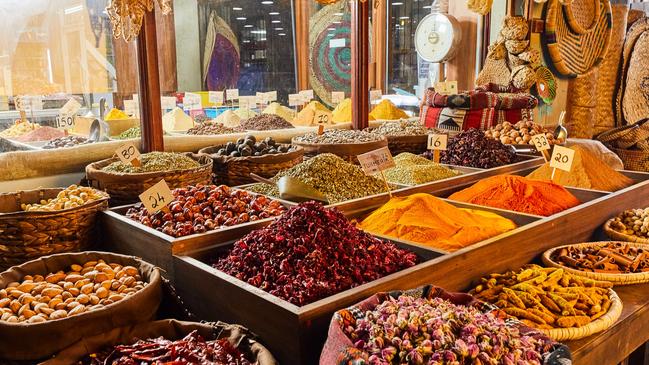
As Qataris take their coffee so seriously, they often buy it fresh from the market. In Doha, Souq Waqif has been the site of such trading between Bedouins and locals for more than 100 years. The original bazaar was destroyed by fire and rebuilt in the early 2000s. A visit here is nothing short of an assault on the senses. In a maze of tight laneways lined with tiny specialist shops, I find incense, piles of frankincense and spices such as cardamon, and every dried fruit imaginable, including five types of dates from Saudi Arabia and Jordan alone. And that’s before I reach stalls devoted to falconry, gold, traditional dress and antiques. Down another lane, packed with restaurants and food stalls, I stop at a tiny majlis to sip coffee, sample sweets and chat with the friendly owner. This is Qatari hospitality at its best, with everyone welcome, and it is all free.
As we leave, a family walks by, the women cloaked in black burkas with only their eyes visible. A young girl in a bright pink dress holding her mother’s hand stares at me and my uncovered face. These are the intriguing, contradictory and confronting worlds that exist in Doha. Yet I want to go back and explore more.
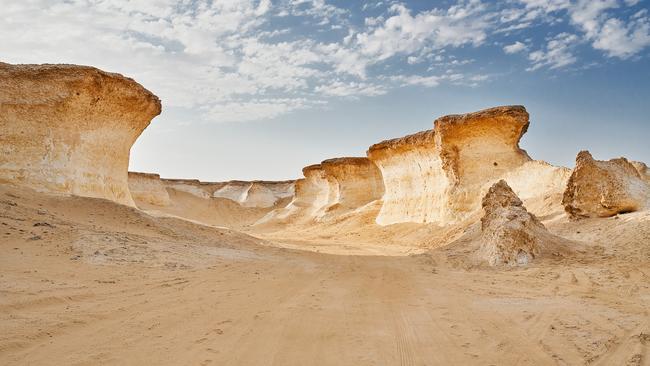
What to see and do
National Museum of Qatar is open daily except Tuesdays and Friday mornings. Tickets can be booked online.
Souq Waqif is in Downtown Doha. Shops open 7am-12.30pm and 3pm-10pm. Syrian restaurant Damasca One is a great option for dinner; open 8am-midnight.
Bayt El Talleh restaurant in the Katara Hills has good views of the city and Katara Cultural Village entertainment precinct.
Try Karak chai tea and cheese-filled chapati from Karak Mqanes stores for a local treat. The company has outlets through the city and at night markets.
facebook.com/karak.mqanes
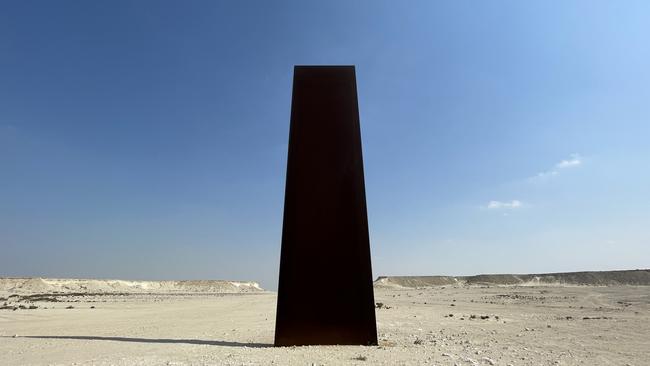
Exploring the wind-shaped limestone cliffs in Brouq Nature Reserve on the Zekreet Peninsula is like walking on the moon. Add Richard Serra’s astonishing East-West/West-East sculpture (pictured), consisting of four steel plates, and it’s as though you’ve landed on the set of Planet of the Apes. The late artist was commissioned by Sheikha al-Mayassa, the sister of the ruling emir, in 2014. Private tours available.
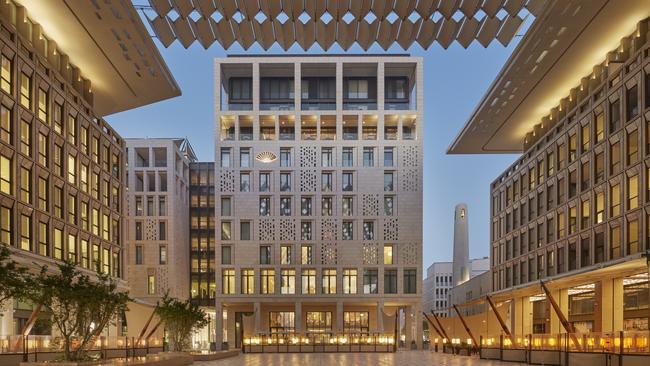
In the know
Our Habitus Ras Abrouq, built in partnership with Qatar Airways, is on the Zekreet Peninsula, 90 minutes by road from Doha’s Hamad International Airport. One-bedroom Brouq Villas from QAR1899 ($787) a night, twin-share, including breakfast.
For a city stay, Mandarin Oriental Doha in the cool urban Msheireb Downtown renewal precinct has superior-category rooms from QAR960 a night, twin-share.
Qatar Airways flies non-stop to Doha from Sydney, Melbourne, Brisbane, Adelaide
and Perth.
Milanda Rout was a guest of Qatar Airways, Our Habitus Ras Abrouq and Mandarin Oriental Doha.
If you love to travel, sign up to our free weekly Travel + Luxury newsletter here.




To join the conversation, please log in. Don't have an account? Register
Join the conversation, you are commenting as Logout